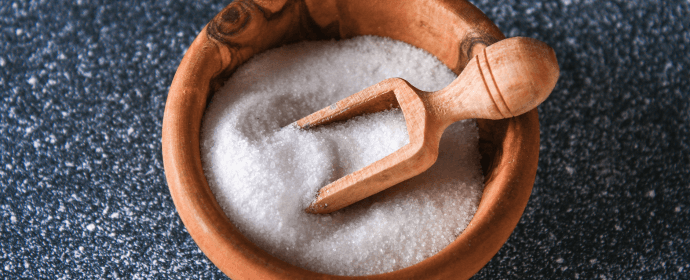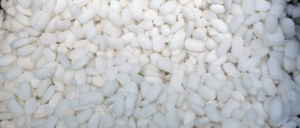Hard water is transformed into soft, calming delicacy by your water softener, which is a legend of your home’s plumbing system. It works relentlessly to accomplish this transformation. What happens if your water softener runs out of salt? A chain reaction could harm your water quality, appliances, and budget.
A water softener, like a fighter, replaces hard minerals in water with sodium ions, making it soft and silky, resembling a warrior’s fight against harsh minerals.
When the salt supply runs out, the power of your water softener reduces. It’s the equivalent of sending your fighter into battle without a weapon, leaving them exposed and ineffectual. Once kept at bay, hard minerals begin to reassert their authority, causing havoc on your water quality and your home’s plumbing.
The Science of Salt and Water Softening
Hard water, containing calcium and magnesium ions, damages plumbing, appliances, fixtures, limescale and reduces efficiency. Water softeners combat this through ion exchange.
A tank of resin beads is housed inside the water softener. When hard water runs over these beads, calcium and magnesium ions are drawn to them and adhere to them. In exchange, the resin beads release sodium ions, changing hard water into soft, gentle water.
However, a vital element is required for this fantastic process: salt. The sodium ions that the resin beads release come from salt in the form of sodium chloride. The ion exchange process pauses in the absence of salt, and hard water continues to flow.
Consequences of a Salt-Deprived Water Softener
The impacts of a salt-depleted water softener may not be immediately obvious, but they will become more apparent with time.
Here are some of the most important consequences:
- Reduced Water Quality: Hard water is not only unpleasant to use, but it can also be harmful to one’s health. It can cause skin irritation, hair dryness, and even gastric problems.
- Appliance Damage: Hard water minerals can build up in appliances such as dishwashers, washing machines, and water heaters, lowering their efficiency and durability.
- Increased Plumbing Issues: Hard water limescale buildup can clog pipes, impede water flow, and even cause pipe corrosion.
Signs of a Salt-Deprived Water Softener
Luckily, you can recognize the warning indications of a depleting salt supply in your water softener. Pay attention to the following:
- Hard Water Stains: White or chalky deposits on your glassware, fixtures, or faucets indicate the presence of hard water minerals.
- Limescale Buildup: Check for crusty deposits in the aerators of your faucets, showerhead, and water heater. These point to the accumulation of limescale, a sign of hard water.
- Reduced Water Pressure: Mineral accumulation in your pipes may be the cause of lower-than-normal water pressure.
Preventing Salt Depletion and Ensuring Soft Water
Take these precautions to avoid the unpleasant effects of a reduced salt supply in your water softener:
- Regular Salt Replacement: Monitor the salt content of your water softener and add more as necessary. Refer to the manufacturer’s instructions to determine the correct quantity and timing of salt applications.
- Keep an eye on your water usage: The amount of water you use determines how often you need to refill salt. Should your family use a lot of water, you could need to replenish the salt more frequently.
- Water Softener Maintenance: To make sure your water softener is operating at its best, schedule routine maintenance. This includes cleaning the resin beads, checking for leaks, and confirming the regeneration cycle.
What happens if salt is empty in water softener?
The power of your water softener to remove minerals that cause hardness from your water supply is lost when the salt in it runs out. Hard water will consequently start to enter your home through your pipes. This may result in several issues, such as:
- Lowering water quality: Hard water can cause unsightly stains on your fixtures, lead to the accumulation of limescale, and lower the water-using appliances’ efficiency.
- Appliance damage: Hard water minerals can build up in water heaters, dishwashers, and washing machines, lowering their lifespan and efficiency.
- Increased plumbing issues: Limescale buildup from hard water can corrode pipes, clog pipes, and restrict water flow, which leads to an increase in plumbing problems.
Can water be softened without salt?
- Indeed, there are a few salt-free methods for softening water. These techniques, however, usually don’t work as well as salt-based water softeners. The following are a few substitutes for salt-based water softeners:
- Ion exchange resins: These resins extract hardness minerals from water by an alternative kind of ion exchange procedure. They do, however, usually cost more and need to be renewed more frequently than salt-based resins.
- Reverse osmosis: This method removes pollutants, such as hardness minerals, by filtering via a semipermeable membrane. Reverse osmosis systems, on the other hand, are the priciest kind of water softener and can also take out some good minerals.
Can we use normal salt for water softener?
No, your water softener should not be used with plain table salt. Table salt may harm the resin beads in the water softener because it frequently contains iodine or other chemicals. Only salt made especially for use in water softeners (also known as water softener salt) should be used.
How do you regenerate a water softener?
Your water softener’s resin beads are cleaned and replenished through a process called regeneration. This procedure usually starts on its own, but if your water softener isn’t working right, you might have to start it manually. You’ll need to replenish the salt tank in your water softener in order to rejuvenate it. The water softener will then use this salt to create a brine solution to wash the collected hardness minerals off the resin beads.
Why does salt get hard in water softener?
Salt in your water softener tank may become hard for a few reasons. One explanation could be that the salt is absorbing moisture from the air. A further explanation could be that the brine solution and salt are interacting to create a hard crust. You should keep the salt tank lid closed and store the salt in a cool, dry location to avoid it becoming hard.
How long does a water softener last?
Usually, water softeners last between ten and fifteen years. However, a variety of factors, like water quality, usage, and maintenance, can impact how long they last. A competent professional should service your water softener once or twice a year to extend its lifespan.
What happens if you put too much salt in the water softener tank?
Too much salt in your water softener tank might damage the brine pump and other water softener components. It can also cause the water softener to overproduce brine, which can lead to pipe and fixture corrosion.
Can humans drink softened water?
Yes, drinking softened water is safe. The sodium ions added to the water during the softening process do not harm humans. Some people, however, may detect a little saltiness in softened water.
What are the disadvantages of a water softener?
The main drawback of a water softener is its cost. Water softeners can be costly to buy and install, and they also require frequent maintenance. Furthermore, some people dislike the flavor of softened water.
Sum-up
Water softeners are beneficial for hard water, protecting plumbing and appliances while improving water quality. However, consider costs and benefits before choosing.
Water softeners protect against hard water but need nourishment. If the salt supply runs out, softener power decreases, leaving homes vulnerable to hard water. Avoid salt deficiency.
Pay attention to the symptoms, replenish its stores, and restore its ability to turn your water from a foe into a friend. Accept the advantages of soft water: the gleaming fittings, the long-lasting appliances, and the pleasant caress on your skin.




Leave a Reply